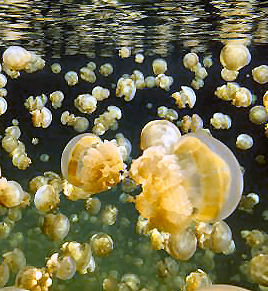30 July 2009
Jellyfish significant contributors to large-scale ocean mixing
by Kate Melville
 Climate change scientists may need to rethink the factors governing the interaction of the world's oceans, thanks to new findings published in Nature that show the global power input from swimming creatures such as jellyfish is as much as a trillion watts of energy, comparable to that of wind and tidal forces.
Climate change scientists may need to rethink the factors governing the interaction of the world's oceans, thanks to new findings published in Nature that show the global power input from swimming creatures such as jellyfish is as much as a trillion watts of energy, comparable to that of wind and tidal forces.
"The perspective we usually take is how the ocean - by its currents, temperature, and chemistry - is affecting animals," says John Dabiri, a Caltech bioengineer who, along with Caltech graduate student Kakani Katija, discovered the new mechanism. "But there have been increasing suggestions that the inverse is also important, how the animals themselves, via swimming, might impact the ocean environment."
Scientists have increasingly been thinking about whether the animals in the ocean might play a role in larger-scale ocean mixing, the process by which various layers of water interact with one another to distribute heat, nutrients and gasses throughout the oceans. Dabiri says that oceanographers had previously dismissed the idea that animals might have a significant effect on ocean mixing, believing that the viscosity of water would cancel out any turbulence created, especially by small planktonic, or drifting, animals.
But the researchers thought there might be a mechanism that had been overlooked, a mechanism they call Darwinian mixing, because it was first discovered and described by Darwin's grandson. "Darwin's grandson discovered a mechanism for mixing similar in principle to the idea of drafting in aerodynamics," Dabiri explains. "In this mechanism, an individual organism literally drags the surrounding water with it as it goes."
Using this idea as their basis, Dabiri and Katija performed mathematical simulations of what might happen if many small animals all moved at the same time, in the same direction. Darwin's mechanism would suggest that they drag some of the colder, heavier bottom water up with them toward warmer, lighter water at the top. This would create instability, and eventually, the water would flip, mixing itself as it went.
The researchers found that the water's viscosity enhances Darwin's mechanism, and that the effects are magnified with very small animals like krill and copepods. "It's like a human swimming through honey," Dabiri explains. "What happens is that even more fluid ends up being carried by a copepod, relatively speaking, than would be carried by a whale."
To verify the findings from their simulations, the scientists traveled to the island of Palau, where they studied animal-led transport of water among jellyfish. Their jellyfish experiments involved putting fluorescent dye in the water in front of the jellies, then watching what happened to that dye and to the water that took up the dye as the jellyfish swam.
Rather than being left behind the jellyfish, or dissipated in turbulent eddies, the dye travelled right along with them, following for long distances. The findings verified that swimming animals are capable of carrying bottom water with them as they migrate upward, and that the movement indeed creates an inversion that results in ocean mixing.
"There are enough of these animals in the ocean," Dabiri says, "that the global power input from this process is as much as a trillion watts of energy." While these numbers are estimates, they are likely to be conservative estimates, Dabiri says. "They were based on the fluid transport induced by individual animals swimming in isolation." In the ocean, these individual contributions to fluid transport may interact with one another, and amplify how far ocean waters can be pulled upward.
Dabiri says the next major question is how these effects can be incorporated into the computer models of global ocean circulation used by researchers involved in climate change research.
Related:
Southern Ocean Could Put Brakes On Warming Trend
Swimming Critters Add New Variable To Climate Confusion
Jellyfish Squish Greenhouse Dogma
Source: National Science Foundation
